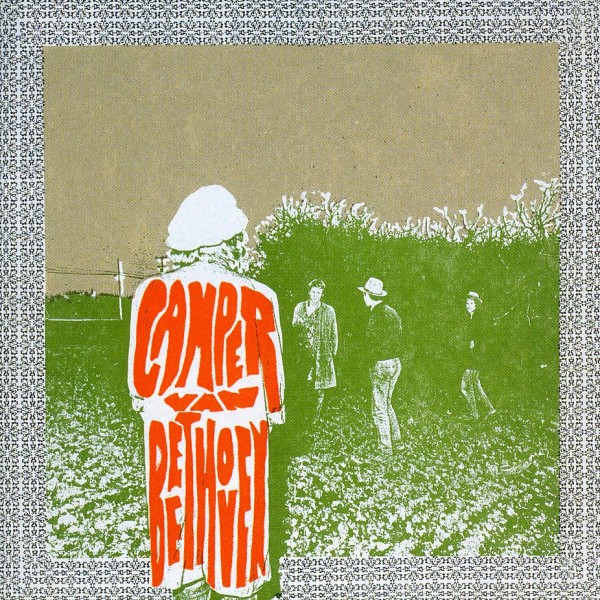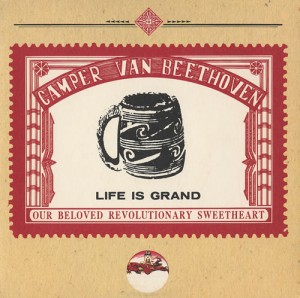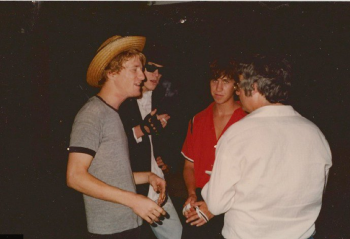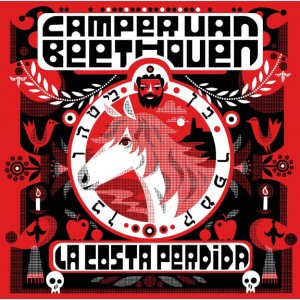
EDITOR’S NOTE: This interview originally posted on January 16th, 2013
BY JONATHAN VALANIA In advance of the eagerly awaited Camper Van Beethoven/Cracker show at World Cafe Life tonight, we got CVB/Cracker mainman Dave Lowery on the horn to talk turkey. Discussed: Bowie, hallucinogenics, Bowling For Columbine, skinheads, Upper Humboldtistan, Patty Hearst, Albanian folk music, The Illuminati, the Inland Empire, La Costa Perdida, what it feels like to be the new Lars Ulrich (pretty good, actually), and just what the hell is a Vampire Can Mating Oven? So Pitch-A-Tent and just get high while the radio’s on. And let us fondly recall The Day That Lassie Went To The Moon.
PHAWKER: OK, let’s start with the elephant in the room, the question that’s on everybody’s mind today — what do you think of the new Bowie single?
DAVE LOWERY: [laughs] I haven’t heard it. I’m not really a big Bowie fan.
PHAWKER: David Bowie is going to be devastated when he reads this. Let’s just move on. Do you remember the day you guys came up with the name?
DAVE LOWERY: Camper Van Beethoven? Yeah. We had the name before we had any songs. David McDaniel was one of the founding members of the band. He was my funny, quirky friend, very devout Christian who spent most of his life as a minister. He also had this crazy stand-up comedy persona that he did where he would say these jokes that had all the reason and rhyme of jokes, but they didn’t really make any sense. He would do some foreign Borat-type accent and say, ‘My country is so small every time we change a tire, everybody laughs!’ I mean, it doesn’t make any sense. And he had this rhyme and reason that was his sense of humor — this whole series of never ending things that sounded like they could be jokes but they deconstructed and destroyed themselves in the process. That’s where Camper Van Beethoven came from. Years later there were all these bands that came along like REO Speedealer and Brian Jonestown Massacre. These two half puns that don’t really go together.
PHAWKER: But it was originally Camper Van Beethoven and the Border Patrol, correct?
DAVE LOWERY: Exactly.
PHAKWER: And that was just another non-sequitur?
DAVE LOWERY: Yeah! Yeah. No apparent reason, didn’t mean anything.
PHAWKER: And where did the fascination with Eastern European folk music come from?
DAVE LOWERY: We thought ska sounded like that, at least the ska that we were listening to back in the early punk-rock days when ska and punk-rock were all mixed together. We would just use those scales and those kind of melodies but we were also really influenced by surf-bands, but we just didn’t play surf beats, but that’s what we were into. But we just put ska and punk rock, and sort of put punk beats and rhythms into the song. Surf music was obsessed with the sound of other cultures.
PHAWKER: And those crazy album titles like Telephone Free Landslide Victory and Vampire Can Mating Oven?
 DAVE LOWERY: Vampire Can Mating Oven was actually from a friend of mine who I had been in another band with and I left to do Camper Van Beethoven. When Camper Van Beethoven became successful he was very derisive and snarky. He used to call us ‘Vampire Can Mating Oven.’ So we called our album that. We didn’t want our name or our song titles or our album titles to really evoke anything. And it seemed to freak some people out. Some of the stuff we did was weirdly controversial. The punk kids would be like ‘Hippies! Why are you playing ‘White Riot’ by The Clash slow in country style?!? Every time we’d play with these punk bands like The Dead Kennedy’s or something like that, we had people who wanted to fight us after the show, because they thought we were making fun of them. The reason we did all those ska songs was generally, if things were going wrong, we could do a really quick series of ska instrumentals, or one of the Eastern European things and they would be okay for another ten, fifteen minutes.
DAVE LOWERY: Vampire Can Mating Oven was actually from a friend of mine who I had been in another band with and I left to do Camper Van Beethoven. When Camper Van Beethoven became successful he was very derisive and snarky. He used to call us ‘Vampire Can Mating Oven.’ So we called our album that. We didn’t want our name or our song titles or our album titles to really evoke anything. And it seemed to freak some people out. Some of the stuff we did was weirdly controversial. The punk kids would be like ‘Hippies! Why are you playing ‘White Riot’ by The Clash slow in country style?!? Every time we’d play with these punk bands like The Dead Kennedy’s or something like that, we had people who wanted to fight us after the show, because they thought we were making fun of them. The reason we did all those ska songs was generally, if things were going wrong, we could do a really quick series of ska instrumentals, or one of the Eastern European things and they would be okay for another ten, fifteen minutes.
PHAWKER: What about Telephone Free Landslide Victory?
DAVE LOWERY: Again, we’re playing with words. There’s a good story that goes with that title. There was this band back in the 60s that we idolized called The Kaleidoscope. One of their classic albums, Beacon From Mars, was actually supposed to be called Bacon From Mars. But apparently it went to the printing plant and somebody just figured it was a misspelling or a typo or couldn’t read the handwriting, and they changed it to Beacon From Mars.
Strange parallel: Telephone Free Landslide Victory was originally called Telephone Tree Landslide Victory. But when we sent it to to Bruce Licher to print the cover, he misread our handwriting and thought it was Telephone Free Landslide Victory. We were like, ‘No, it’s Telephone TREE Landslide Victory!’ And he was like, ‘Oh, shit!’ But he’d already hand-printed fifteen hundred covers. And the we were like, ‘Wait, that’s better!’
PHAWKER: “Take The Skinheads Bowling,” your first single, was this fully-formed perfect pop song. Maybe the CVB’s best song. What’s the back story?
DAVE LOWERY: I just got this idea that I thought a lot of great songs really didn’t mean anything; it was kind of just cool, the way the words went together, and that that should be celebrated. So, I was really carefully trying to make it so that each line didn’t really seem like it had anything to do with the line before it.
PHAWKER: So all these years that I thought I just wasn’t deep enough to get the meaning of ‘Every day I get up and pray to Ja, and he decreases the number of clocks by exactly one’ and it turns out it doesn’t mean anything at all.
DAVE LOWERY: Yes, absolutely, yes.
PHAWKER: And then 10 years ago, Michael Moore used it for Bowling For Columbine, which has taken a renewed relevance as of late. How did that come about?
DAVE LOWERY: I basically got the call, ‘Hi, I’m Michael Moore, I don’t know if you know who I am, but I make documentaries?’ I’m like, ‘Of course I know who you are!’
PHAWKER: Early on there was this perception that you guys had spent a lot of time tripping out in the desert and emerged these sort of wild-eyed, blissed-out alt-rock mystics. You guys seemed to play that up a bit. I remember reading a quote, I think it was in Spin, from one of you guys saying that you were totally paranoid and totally obsessed with the Illuminati. Tell me where your heads were at back then. Were you guys as high as everyone thought you were?
DAVE LOWERY: No. Well I mean occasionally. I mean Halloween in Columbia, Missouri, at the Blue Note, we thought that it was a good idea to take mushrooms before we played and it was like, totally crazy, and one time in Las Vegas too, actually. We wound up getting unplugged. But otherwise, there wasn’t really a whole lot of that. That was, you know, kind of our public persona, that we were these crazy underground paranoid conspiracy theory, but it was such good fodder for the songs.
PHAWKER: Your major label debut was called Our Beloved Revolutionary Sweetheart, a reference to Patty Hearst, a rich heiress that was kidnapped in the early ‘70s by this militant group of leftover 60s radicals who called themselves the Symbionese Liberation Army. They brainwashed/radicalized her and there was this famous security camera footage of her wearing a black beret and brandishing a rifle, robbing a bank with the SLA. My question was going to be why her, but having said all that out loud, I think I already answered my own question.
DAVE LOWERY: Because she represented the crash of the hippie dream. That was a key theme for Camper — and it still is, the new record is all about that — the post-hippie idealism, after it crashed, and sort of falls apart, and the false parts are exposed, but then you can also see the good parts of it. We played with that a lot. We played with the bad, dark side of the hippie experience. ‘We’re a bad trip.’ We sing a song about Patty Hearst, the revolutionary idealist/pseudo Maoist, running with these rich, college educated liberals. She’s from northern California, the Bay Area. She was the perfect subject for us to sing about.
PHAWKER: And the new album is called La Costa Perdida, which means The Lost Coast. Is that an actual place?
 DAVE LOWRY: There’s two sort of meanings of The Lost Coast. The Lost Coast, is a very specific geographic part of northern California that you can find on the map, north of Point Arena and South of Eureka. But its’ broader meaning refers to the whole sort of lost, country, hippie, outback pot grower from Humboldistan part of California. It’s not just geographic, it defines a culture, an attitude, a lifestyle, a way of living, a way of being. So the record is about California, and these ideals that were passed over and have been lost in time. Sort of a fond look at this lost time.
DAVE LOWRY: There’s two sort of meanings of The Lost Coast. The Lost Coast, is a very specific geographic part of northern California that you can find on the map, north of Point Arena and South of Eureka. But its’ broader meaning refers to the whole sort of lost, country, hippie, outback pot grower from Humboldistan part of California. It’s not just geographic, it defines a culture, an attitude, a lifestyle, a way of living, a way of being. So the record is about California, and these ideals that were passed over and have been lost in time. Sort of a fond look at this lost time.
PHAWKER: Speaking of which, why did Camper Van Beethoven break up?
DAVE LOWERY: Basically, that Key Lime Pie album was seen as… It got kind of bad reviews and a lot of people didn’t sort of get it compared to our other albums. So there was sort of a dispirited feeling among the band that made it easy for the band to break up. That’s honestly what broke the band up. Plus, there were bands within the band, that were always competing with Camper Van Beethoven. Jonathan had is solo career. Victor, Chris and Greg had Monks Of Doom, and in some ways, they would hold those projects superior to Camper Van Beethoven, so there were many differences between us with the fact that we didn’t seem to be that successful and sort of seemed to have made a weird turn with Key Lime Pie. It made it really easy for the band to break up. So they left to pursue Monks Of Doom. Now, I was the only original member left in Camper Van Beethoven. The record company wanted me to keep going, but I said ‘No,’ I was just gonna start fresh with a new project [to be called Cracker] and so they optioned me. Which is not really a good thing, a lot of people are like, ‘Well he got the record deal.’ No, when you get optioned, and the leaving member clause is exercised, the contract is signed to you along with all the debt. So I took all of Camper Van Beethoven’s debt, and you know it took a couple Cracker records to pay off Camper Van Beethoven’s debt. So, that was actually a good thing. After a few years, the other Camper guys learned to not look upon this enviously because ‘Goddammit, I was paying off your fucking debt.’ Anyways, that’s what happened. That’s where Cracker came from.
PHAWKER: Let’s talk a little bit the very public stand you’ve taken against pirating music. How did that come about and were you at all concerned about becoming the new Lars Ulrich?
DAVE LOWERY: I wrote a 12,000 word analysis of whether the old record label system versus the new digital distribution was better, based on how much the revenue was received, that kind of went viral. And when you look at it, you see that actually, under the bad old record label system, it was a little better. It’s not a huge difference, but it is better. So I had already pissed off all of those people anyways.
When I wrote that and posted it on Facebook, the first comment on it was like, ‘We’re gonna make you like the new Lars Ulrich!’ But what I really learned from that back in January, early February [2012] , when I wrote all of that stuff, was that there’s a lot of bluster on the Internet, especially about free music and free culture. But those people aren’t fucking paying for music anyways, they’re going to steal your music anyways, what does it fucking matter if you piss them off?
PHAWKER: Makes sense.
DAVE LOWERY: After eleven months of keeping very careful track of Facebook likes, computer mentions, blah blah blah, what did all this stuff say, ticket sales, things on the radio — it had no negative downside. There was no downside for me from all of this. In fact, there was a marginal gain. It’s not like I was trying to do this, I didn’t do it to be famous, but I had a hunch — and I was totally right — that those Internet bloggers and the things that people said on Facebook and Twitter, that’s all just fucking hot air. Plus, I’m right. I really am right. Okay? Here’s why, this is what’s wrong with the current system, basically, you’re making the people that do support music pay for the people who are taking music for free. They are freeloading on the fans. There’s a great book out right now that spells all this out called Freeloading by Chris Ruen.
The Free Culture Movement — free culture, free music — it isn’t free. People are willing to pay for the hardware that receives all that free content: iPhones, iPods, iPads, laptop computers. They will pay for that part of the music listening  experience and they will pay money to large monopolistic multinational, multi-billion dollar corporations. They will also pay real money for the music experience to the service providers- whether it’s the 4G providers, the 3G providers on their phones, their broadband experience providers, or even if they’re just going to Starbucks and buying a cup of coffee so they can get on their Wi-Fi. They’re paying real money for the pipes, for the hardware and the pipes. They’re paying real money for that. And largely, the pipes are just large, monopolistic multi-billion dollar, multinational corporations.
experience and they will pay money to large monopolistic multinational, multi-billion dollar corporations. They will also pay real money for the music experience to the service providers- whether it’s the 4G providers, the 3G providers on their phones, their broadband experience providers, or even if they’re just going to Starbucks and buying a cup of coffee so they can get on their Wi-Fi. They’re paying real money for the pipes, for the hardware and the pipes. They’re paying real money for that. And largely, the pipes are just large, monopolistic multi-billion dollar, multinational corporations.
Seventy-five thousand albums were put out last year, approximately. About one, one and a half percent of those were put out by the major record labels. All the other music, the vast majority of music that came out, is either small, independent labels or artists putting it out themselves. Something like six hundred or eight hundred were put out by major labels. The bottom sixty thousand albums sell an average of about a hundred something each. So that’s like your hobbyist local bands, or whatever like that. Only the top two thousand albums sell more than ten thousand copies. And that’s a lot these days. That’s the top two thousand. So, you know, Camper probably barely makes it into that. Cracker definitely does, but we’re not in the top albums.
So basically, under the digital free culture thing, basically, it’s a corporate counter-revolution, is what it is. It’s a massively regressive activity in which we only pay those at the top of the pyramid, and we rip off the people at the bottom of the pyramid. It’s a lot like the ideas of the Tea Party espouses. It’s largely liberals and college-educated academics and stuff like that, that espouse the street culture viewpoint. I’m sorry, but I’m right, that is total bullshit. I don’t care if anybody disagrees with me.
But let’s just tell the truth: People want music to be free. They don’t want to pay for it. It’s not about convenience, it’s not about ideology, it’s not about anything. And why they fuck should we collectivize property on the Internet? We’ve had experiences with collectivizing property before. It’s called Communist China, it’s called the Soviet Union. It’s never really worked out well for anybody. It always ended badly.
We’re going to collectivize all culture on the Web? That doesn’t sound like a good idea. So how does culture get made? Well, the only way that culture gets made is then you have rich corporate sponsors or rich individuals, or the government, deciding what music gets made.
